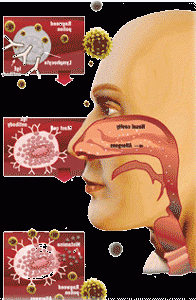

[vc_row][vc_column width=”2/3″][vc_column_text]
 Hay fever (Allergic Rhinitis) can cause symptoms such as a runny nose, itchy eyes, congestion, sneezing and sinus pressure.
Hay fever (Allergic Rhinitis) can cause symptoms such as a runny nose, itchy eyes, congestion, sneezing and sinus pressure.
It is caused by an allergic response to outdoor or indoor allergens, such as pollen, dust mites or tiny flecks of skin and saliva shed by cats, dogs and other animals with fur or feathers (pet dander). For more information about how allergies develop (link what is an allergy).
Grass pollen is the most common allergen, which affects sufferers at the specific times of the year when grass pollen is released (May-July). However, some people become allergic to tree or weed and shrub pollens and will, therefore, be affected at various times of the year (February-June and September – November for trees; July – October for weeds).
[/vc_column_text][/vc_column][vc_column width=”1/3″][vc_widget_sidebar sidebar_id=”allergies-menu” el_class=”service-submenu”][/vc_column][/vc_row][vc_row css=”.vc_custom_1552617478149{padding-bottom: 30px !important;}”][vc_column width=”2/3″][vc_column_text]
Many people suffer the symptoms of itching, burning, watering and redness of the eye, and puffiness of the eyelids.
Diagnosis of Allergic rhinitis or Conjunctivitis requires a complete review of your history and physical exam.
To help determine specific triggers, allergy testing is also helpful.
Types of allergy test:
Skin test (LINK) – Food, Environmental, Drug
Blood Test (LINK) – Food, Environmental, Drug
Like most allergists, we opt to perform skin testing as it is safe, reliable and yields prompt results that we can use to tailor your individual treatment plan.
Avoidance of your specific triggers is the best way to manage allergies and reduce your need for medications.
Medications for hay fever and allergic conjunctivitis include:
Allergy Shots or Tablets (Allergy Immunotherapy) helps to shift your immune system away from its allergic tendency and can lead to reduce symptoms and need for medications over time.
Your doctor can help determine which type of therapy is best for you.
Additional Resources:
https://acaai.org/allergies/types/hay-fever-rhinitis
[/vc_column_text][/vc_column][/vc_row]